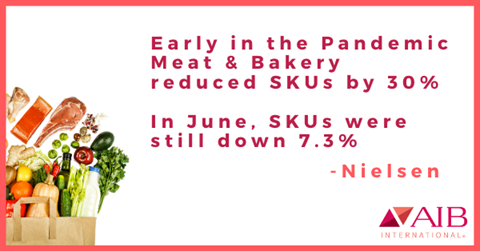3 Issues Your Intermittent Operations Plan Should Address
Everyone recognizes that it’s better to plan for the worst than to make it up as you go in the middle of a crisis.
Wouldn’t it have been much easier to navigate COVID-19 if your company had a plan in place to address complex operational challenges?

Intermittent Operations Planning
Intermittent Operations Planning includes maintaining operations through a crisis, planning for a shutdown, and planning for a post-crisis restart.
One of the five foundational components of AIB International’s Pandemic Prepared Certification, Intermittent Operations Planning addresses communication between sales, operations, procurement and human resources to ensure effective management of resources including materials, workforce and downtime availability through the crisis.
3 Critical Components of Your Intermittent Operations Plan
1. How to Maintain Operations During the Crisis
In addition to essential communication among your teams, it is critical that even during extended production runs, adequate downtime must be scheduled so required maintenance and sanitation activities can be completed.

2. Your Shutdown Due to the Crisis
This covers everything from how you will handle raw materials to communicating with your employees about what to expect and then actually initiating a shutdown of the facility.
3. Post-Crisis Start-Up Planning
This third component addresses how you should bring the facility back online and resume operations. While leadership and employee communication continues to be important during this stage, planning for your start-up sequence and conducting a documented site inspection should also take place.
Intermittent Operation Plan Examples
During the COVID-19 pandemic many facilities have been challenged with stopping and restarting production lines due to supply shortages and workforce illness. Reduction of SKUs (stock keeping units) to focus on volume for essentials became common. Due to the disruption of routine operations, food safety and workforce safety may become compromised.

Production Line Shutdown Issues
In some areas around the globe, governments have mandated ceasing all operations to control the spread of the disease. In other situations, companies have made the decision to shut down in order to allow their workforce to recover from the illness or because necessary supplies were unavailable. This type of shutdown is very different from a weekend shutdown.
Consideration for handling perishable and insect susceptible materials, reduction of raw materials and finished goods, and preparing the site for long-term inactivity are only some of the elements that require planning.

Production Line Start-Up Planning
After you’ve ceased operations and are ready to start up again, the condition of your site, equipment, and materials must be assessed and any identified problems must be corrected before operations can resume. The workforce must be kept updated through your return-to-work planning.
As we’re currently still in the midst of the COVID-19 pandemic, you must resume operations with your plan for running during the crisis. In addition, we must plan for how this contingency will be handled on a day-by-day basis.

Certification that Boosts Employee Confidence
The COVID-19 pandemic has forced some high food and beverage companies to spend millions – one company said they spent $340 million – in response to the crisis.
You can successfully navigate the impacts of pandemic with a written plan that elevates critical planning for people, facilities and production inputs. Achieving Pandemic Prepared Certification recognizes that your company upholds the highest standards of integrity in the global food and beverage supply chain. This certification provides internal and social benefits, business continuity, and significant bottom-line impacts due to your demonstrated commitment to decreased risk.
Sign up for your free Preparedness Review and receive a series of checklists you can use to review your plans and protocols.
Or contact us at ppc@aibinternational.com and we’ll provide you with the right expertise.

Peg Ray
Peg Ray is a Technical Services Manager at AIB International, where she supports food and beverage companies on emerging food safety and integrity issues. Peg has over 40 years of experience in the food industry and was one of the first women in Food Science at the Michigan State University. Peg is an in-demand expert on pandemic preparedness and good manufacturing practices (GMPs).
Pingback from aibinternational.com
Food First Blog | Four Critical Steps to Pandemic Crisis Preparedhttps://www.aibinternational.com/en/Food-First-Blog/PostId/1387/four-critical-steps-to-pandemic-crisis-preparedness



